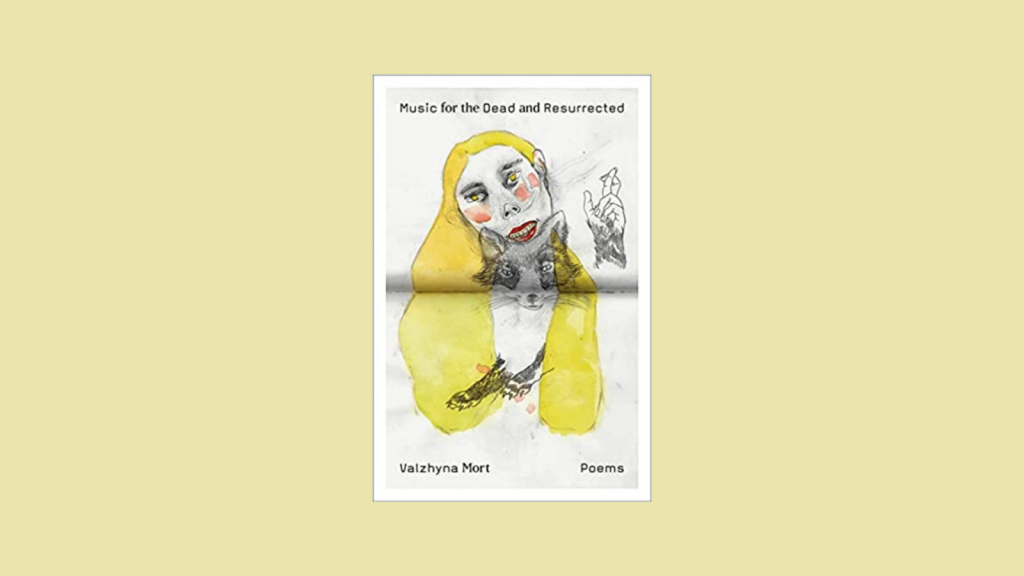When his latest collection, Deaf Republic, was published, Ilya Kaminsky said, “I think great poems are like spells. They’re not just about an event. They become an event themselves.” To recreate events that make a nation’s history, events that are missing from a collective consciousness; to be the healing event. As in Deaf Republic, this drives the poems in Valzhyna Mort’s elegiac third collection, Music for the Dead and Resurrected. Mort’s poems aim to remind us of the forgotten in her native Belarus, where authoritarian violence is often the backdrop of memory. The poems in this collection are incantatory. The thematic and phrasal repetitions within them are methodical, almost appearing to be written in traditional poetic forms. Mort writes, “On the borderlines of my motherland/ –wet laundry claps in the wind like gunfire./ Have you heard of my motherland?” On these borderlines, war and the domestic are inseparable. These poems seek to extract a personal heritage from a politicized notion of history, and the journey overwhelms the speaker, “For me, your stories [pravdas] replace real life. These stories/ keep me inside them like a circle of fire.” In this image, the family stories are either protecting the speaker or closing in on her, and throughout the collection, they do both. Music for the Dead and Resurrected is a timely antidote to popular over-identifications with nationally-sanctioned narratives, the kind that disappears the nuanced stories that help shape an individual’s sense of home and purpose. For Mort, these pravdas, these stories of what-really-happened, are a shield against dictatorial untruth. And to show gratitude, she buries her dead.
The collection’s opening poem, “To Antigone, A Dispatch,” is an apostrophe to Oedipus’ daughter, another female figure with a love for “a proper funeral,”; a love that contradicts the desires of the political powers at hand. The poem’s speaker implores Antigone to join her in sisterhood. She imagines a world where the two women work together to put their dead to rest, “Once we settle your brother,/ I’ll show you forests/ of the unburied dead.” They do this while depicting the repetitive nature of gender roles in war; men die in battle, and women bury their dead: “We’ll clean the way only two sisters/ can clean a house:/ no bones scattered like dirty socks,/ no ashes at the bottom of kneecaps.” Associating Antigone with the collection’s speakers suggests they possess the same fatal flaw: perseverant family loyalty. Thus, no matter the cost, the act of purifying the departed through burial is a defiant act of loyalty and love for family. And in the world of these poems, these loving burials begin with song.
The first words of Music for the Dead and Resurrected establish the collection’s soundtrack with a sonata or symphony, “allegro for shooing off the police/ adagio for washing the body/ scherzo for soft laughter and tears/ rondo for covering the body with good earth.” In these lines, Mort uses musicality to beckon to the departed. The burial process cannot begin without the “shooting” of the police or the removal of the state from the story. An allegro, or energetic song, helps with the hurrying away of the regime. The use of adagio evokes a reverent sadness that exemplifies the living caring for their dead. The scherzo, a playful composition for “soft laughter and tears,” suggests the totality of life: joys undertaken alongside grief. The opening quatrain’s final line is set to a rondo, a final musical movement that makes a theme clear: the dead need not only be buried; they must be buried well.
Mort’s impulse to use a musical vocabulary to call to her ancestors is explained through her biography. In the poem “Music Practice,” the connection between music, Belarus, and Mort’s family is drawn by describing her childhood accordion practices, “Should I go ahead and profess/ that in the name/ of that man who played any instrument thrown at him/ –a cimbalom, a mandolin, a fiddle–/ but ended up quickly killable/ once thrown into a war / (not even a Great one at that)/ I was drafted into music.” Here Mort tells the story of her grandmother’s father, master musician, and unlikely soldier who died when her grandmother was still a child. He’s also the reason why Mort’s grandmother introduced her to her childhood instrument; the accordion. Here, the music that the speaker is “drafted” into is an unrequested inheritance. Accordion lessons are the method by which the poem’s grandmother endeavored to preserve the “sole memory” of her father, “a man singing a tune in a gooseberry yard.” The narrative thread of “Music Practice” takes an unexpected turn, however, when the speaker addresses her deceased grandmother regarding the quality of their shared, inherited musical talent, “I had neither ear nor voice for it/ (neither did you, I would add/ since now you cannot contradict me.” These lines imply that it is neither pleasure (later in the collection, the speaker admits that, “My nightmares stop when, at sixteen, I quit studying music”) nor talent that kept the young girl and her grandmother bound to their music practices. Instead, they carry out their music practices with an almost-mythological sense of duty to offer “thirty-two thousand hours of music.” But offer these hours to whom? Because of its connection to the family’s past, duty to music becomes duty to the family’s dead, especially in the speaker’s grandmother’s eyes.
However, the speaker’s self-perceived absence of heritable talent also has a sweet side-implication—that utilizing art as a conduit for complex and personal communications does not require mastery. But the central intention for these musical burials, their aim to disrupt cycles of violence, is crystallized in the poem “Rose Pandemic” with the lines, “I carry my dead in order to tuck them into/ shrouds woven from sound,” and “Music which, over accordion keys,/ unclenches the fist of ancestry/ loosens fingers into rose petals.” Stalinism, the Word Wars, the declivity of the USSR, the Chernobyl disaster, and the current dictatorship are just a few examples of the mass dislocations in Belarus’ history that induced aggregated traumas that became a connective tissue between generations. In these lines, the reason why the speaker seeks musical burials for Belarus’ dead is made clear: she seeks the peace symbolized by the “unclenched fist” of Belarusian “ancestry.” She soothes her dead with music, but she also soothes herself with their eventual and proper burial. Her graves have ensured a new kind of inheritance can be left behind with their “marble like newborn skin.” This new inheritance could become a new Belarusian story: the story of the ancestor who could no longer bear the unrest of ghosts, whose dutiful love was a song that sung the voiceless to eternal rest.
One of the longest poems in the collection, the prose poem “Baba Bronya,” is a literal and figurative illustration of the voiceless, an example of how state-sponsored normalizations of cultural silence can permeate a family’s own culture. Once more, the speaker addresses her grandmother. The poem opens on Pravda Avenue, a symbol of silence, or truth-according-to-government. But it also begins with the family’s pravda, or truth, as protected by the women, “On Pravda Avenue, four women protect 60 square meters of our family pravda.” What the speaker doesn’t realize is that for seven years of her life, her grandmother’s aunt, Baba Bronya, has been living in her family’s second bedroom, a room in which the speaker admits she’s “never set foot inside.” The speaker’s inability to access a part of her own home is a stunning metaphor for how family concealments can be detrimental to powers of perception. Without all the facts, all the voices, how complete can an understanding of reality really be? What is overlooked? Who is overlooked? Baba Bronya is invisible to the speaker until the day she presents herself.
In contrast, the speaker practices her accordion, and Baba Bronya “emerges to music through the doorway,” a thematic continuation of music beckoning to the past. However, despite her invisibility, Baba Bronya has always been a constant in the speaker’s life. Unprepared by her family for her first encounter with Baba Bronya, the speaker reacts, “I am seven years old and scream my lungs out,” and, “I enter my years of nightmares and utter terror of being by myself.” This image encapsulates the urgency of Music. Baba Bronya’s voicelessness had rendered her a ghost before her time despite the fact she was once a woman so lively that she was unforgivable for “having a good time during the war.” Now, with her namesake poem, she is lively once more. This relationship between Belarus’ living and dead is a type of magic. The past is a mysterious power as the dead literally and metaphorically continue to appear within the living: in music, in family, in the sprawling, plentiful Belarusian trees.




